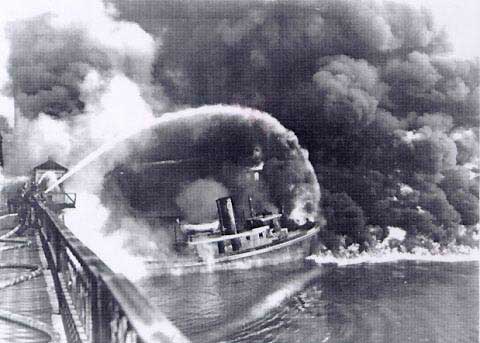"Within
two
decades of the end of World War II, nearly everything about
American life had been altered." (p. 7)
"Americans wanted more, and they wanted it faster"
How completely new was the dramatic change in public opinion on environmental issues in the 1960s?
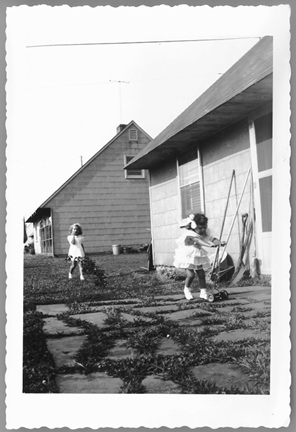

Traffic in Los Angeles, 1949
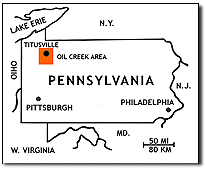
Beginnings of the Petroleum Industry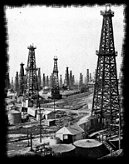
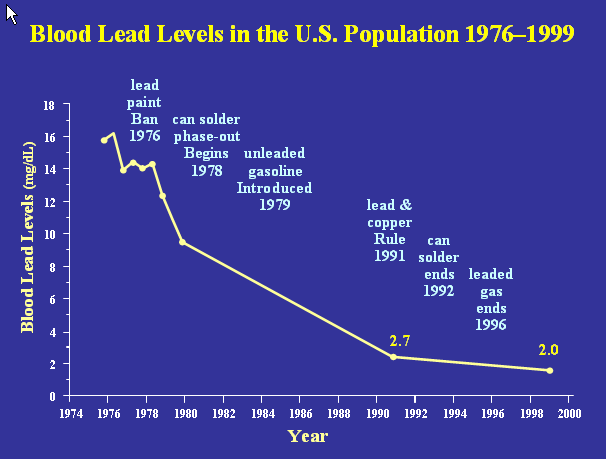
chart from ehw.org
People began to realize that
pollution was
hurting them.
The new Conservation
"Americans wanted more, and they wanted it faster"
How completely new was the dramatic change in public opinion on environmental issues in the 1960s?
- it was in some ways a continuation of the conservation movement
- increase in role of
government, particularly government regulation
- concerns about
pollution
and environmental degradation were growing even before
1960, but they
begin to be addressed more on a federal level
- in other ways it was
radically new--questioning
progress, wider
concern for nature for nature's sake
- the Sierra Club was
founded in
1892 by Muir but also by important people like the
president of
Stanford University
- the Progressive Era (early 20th century) was a time of reform--cleaning up corruption and dirty cities
- big cities had become corrupt places, there were no laws to protect people injured on the job or to protect consumers from dangerous products
- cleaning up corruption
often
included cleaning up pollution and trash that companies
could get away
with under the corrupt city governments
- people began to believe
that the
government should take responsibility for protecting the
weak and
consumers
- settlement house
movement--community groups trying to help the poor, Mary
McDowell
- early history of regulation
- The traditional belief was that ordinary people could and should watch out for themselves (buyer beware), but as consumer goods came to be made far away instead of locally and technology became more complex that didn't work so well any more.
- employees had no right to compensation for accidents from their employers because of a legal principle called "fellow servant"
- The progressive movement around 1900 led to the first regulations. Anti-trust regulations around 1900 and the Pure Food and Drug Act (1906). Workers compensation started in the 1910s.
- so that is how government regulation
started
- Progressives wanted to replace corruption with efficiency and professionalism--not just help the poor but use social science to find out the best way to do so
- experts know best (an idea that has been slowly declining since the late 1970s)
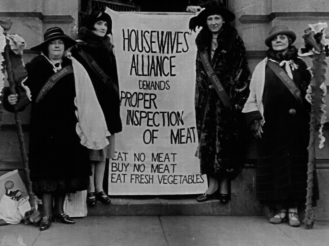
- they tended to think they knew what was best for everyone else
- the conservation movement in the first half of the 20th century was tied in with the Progressive movement
- emphasis on letting the experts decide
- relatively small group of people who wanted to make things better
- protecting special
places
and animals
Progressive
idea about protecting the weak members of society led to
a new belief
in government regulation, including of pollution
Progressive movement (early 20th century)>>New Deal (1930s) expansion of government role>>WWII experience of the power of science and technology
After WWII the factories were quickly converted to make consumer goods (unlike after WWI there was an economic downturn when the demand for war materials disappeared)
Progressive movement (early 20th century)>>New Deal (1930s) expansion of government role>>WWII experience of the power of science and technology
After WWII the factories were quickly converted to make consumer goods (unlike after WWI there was an economic downturn when the demand for war materials disappeared)
- for example, factories making radar sets were quickly converted to make TV sets--a technology ready to take off
- returning veterans had new opportunities--they got help with college tuition and expenses and then help with mortgages
- many people had money to spend and they wanted more consumer goods
- they felt at first their dream was being realized--their own house and car, new things like television, life was good
Post World
War II transformation--a lot
more people started caring about environmental issues,
particularly
those that affected them where they lived.
Suburbs
- wealth--they could afford to care
- suburban movement--what people valued in the places where they lived changed
- wealth meant
more products
therefore more factories and more pollution
Suburbs
- Cities were growing very fast. Between 1870 and 1920 New York City expanded from less than a million to 5 1/2 million population. Density increased in the center city with the invention of the elevator and steel frame construction.
- New York grew larger in size as well--from 22 to almost 300 square miles.
- Urban services--particularly handling
garbage
and sewage and providing water--had a hard time keeping
up.
The progressives planned new expanded systems.
- The first suburban explosion resulted from streetcars. People lived in row houses (townhouses) within walking distance of a trolley stop

- The Progressives invented urban planning. By about 1910 they had the ideas of a central business district, zoning, a system of parks and parkways, and planning roads to allow circulation--including the first limited access highways. These plans were very successful--the value of central property went up and therefore the tax base.
- Automobile based suburbs were growing even before WWII
- What did middle class people want?--safety, uniformity, yards, etc.
- The automobile corresponded with American values on independence and privacy.
- To get this people were willing to move further and further out. In the 1920s Los Angeles opened 3200 subdivisions
- prosperity--many new
technologies (such as TV) and people were rich enough to
buy them
(partly because the GI bill allowed many soldiers to go
to college)
- huge growth in
suburbs and
a high value put on family life and where you
lived--people
increasingly wanted their own home with a yard
- After the war many
returning soldiers married and started families and
wanted to own a
home--new suburbs were built even more rapidly
- Farmland became
housing
developments
- Planned towns-- Levittowns (first in 1949). Only in 1960s were proposals for cluster zoning to leave open space successful.
- Identical houses could be built
rapidly
from standardized parts
- The attached garage replaced the front porch, and large lots allowed space-wasting one story ranch houses.
- Suburbs were very segregated, not just by race but by income level and often ethnicity (red-lining), also further separated the world of men and women.
- people who wanted suburban life believed that they had a right to quality of life--that is what they expected to find in suburbs
- suburbs caused some environmental
problems
such as automobile pollution
- Farmland became
housing
developments

Traffic in Los Angeles, 1949
Environmental impact of postwar
prosperity:
- by the late 1950s there began to be questioning of the suburban dream--you could have a nice house and life somehow still seemed empty
- people moved to
the suburbs
to have nature around them and that was disappearing
- for the first
time there
began to be a shortage of wood as so many new wooden
homes were built
(led to more cutting in National Forests)
- many more people commuting by car (plus goods transported by truck) meant increased demand for fuel
- whole new cities had grown up around wartime manufacturing
- prewar approaches to pollution by simply diluting it (eg. by dumping it in a river) didn't work as well any more
- the Cuyahoga River in Cleveland caught fire
- People first thought
the automobile would clean up the city--compared to
horse manure and dead
horses
- Automobile created a whole new industry to provide fuel. Automobiles run on gasoline, a relatively light fraction of crude oil. Diesel fuel (which is essentially the same as home heating oil) is a relatively heavy fraction.
- The heaviest fractions (bitumen or rock asphalt) had been used for centuries for waterproofing and after 1800 for roads. Kerosene was used in lamps from the 1850s.
- In 1859 an American industrialist, George H. Bissell began a deliberate search for oil. They chose a site in Pennsylvania, drilled through 70 feet of bedrock, and used the oil from the well for illuminating gas, lubricating oil, and an excellent lamp oil. Within 15 years production in the Pennsylvania field had reached 10 million (360 lb) barrels a year.
- John D. Rockefeller established Standard Oil in 1870. By building a pipeline system he soon gained control of 90% of a rapidly-growing industry and became for a while the richest person in the world.

Beginnings of the Petroleum Industry
early oil refinery

- The oil was distilled to separate the fractions--first gasoline (1.5 to 15 percent, depending on the crude), which at first was a nuisance because it was highly inflammable and had no use, then kerosene, and then lubricating oil. For a good explanation of refining see Modern Refining.
- With the popularity of the automobile suddenly gasoline was in greater demand than the other fractions, and cracking was invented by William Burton at Standard Oil in 1913. Heavier fractions are converted into lighter ones by subjecting them to high temperature and pressure to break down the chains of carbon atoms into shorter ones. Industrial research labs competed to find more efficient ways of doing this, most important catalytic cracking with a platinum catalyst in the 1920s.
- problem of engine knock arose just before WWI as refineries tried to widen the cut. Solved by the 1922 introduction of tetraethyl lead as a fuel additive. To prevent lead from fouling the engine ethylene dibromide was added to react with the lead residue and make sure it was funneled out of the exhaust system into the atmosphere (at the time the only questions raised were about hazards of the lead to refinery workers).
- why didn't they think this was
dangerous--because the hazardous material would be
diluted by the
atmosphere
- Industry fought evidence of the health
hazards
of lead
- leaded gasoline was phased out starting in the 1970s because the lead that got into the atmosphere and fell into the soil in heavily traveled areas was identified as a significant cause of lead poisoning.

chart from ehw.org
The new Conservation
- a new emphasis on wilderness
- organizations like the Sierra Club and the Wilderness society only slowly became willing to fight, to play confrontational politics
- the Forest Service was too much influenced by the companies that cut timber in National Forests
- the Park Service was in the tourist business
- the Bureau of Reclamation was in the dam building business
- those dams provided the water for the growth of cities like Los Angeles and Phoenix
